This site is supported by our readers. We may earn a commission, at no cost to you, if you purchase through links.

Natural and organic sensitive skin care products offer a gentler approach by eliminating harsh chemicals, synthetic fragrances, and irritating preservatives that can trigger flare-ups.
These products harness plant-based ingredients like chamomile, oat extract, and jojoba oil to soothe inflammation while strengthening your skin’s protective barrier.
Look for certifications like USDA Organic or EWG Verified to confirm you’re getting the real deal.
The best part? You’ll likely see fewer breakouts and less redness within weeks of switching.
But here’s what most people don’t know about choosing the right products.
Table Of Contents
- Key Takeaways
- Benefits of Organic Skincare for Sensitive Skin
- 10 Best Natural & Organic Sensitive Skin Products
- 1. Natural Face Moisturizer Cream
- 2. Grass Fed Whipped Honey Balm
- 3. Natural Microdermabrasion Facial Exfoliator Scrub
- 4. Grass Fed Beef Tallow Moisturizer
- 5. Natural Strawberry Lip Balm Moisturizer
- 6. Natural Baby Eczema Healing Ointment
- 7. Avalon Organics Vitamin C Moisturizer
- 8. Gentle Kids Foaming Face Wash
- 9. Natural Verbena Soap Gift Set
- 10. Natural Organic Lip Balm Trio
- Key Ingredients for Sensitive Skin Care
- Harmful Ingredients to Avoid
- Choosing The Right Organic Skincare Brand
- Frequently Asked Questions (FAQs)
- What are natural and organic skincare products?
- What are the best natural skincare products for sensitive skin?
- Can organic skincare help sensitive skin?
- Why should you choose organic & nontoxic skincare products?
- What are the best organic skincare products?
- What skincare is best for sensitive skin?
- What natural products are suitable for sensitive skin?
- Which organic brand is best for skin care?
- What skin care ingredients to avoid if you have sensitive skin?
- What is the best natural skin care for sensitive skin?
- Conclusion
Key Takeaways
- You’ll reduce irritation significantly – Natural products eliminate harsh chemicals like parabens, sulfates, and synthetic fragrances that trigger flare-ups, with many people seeing fewer breakouts within weeks of switching.
- Plant-based ingredients actively heal your skin – Ingredients like chamomile, oat extract, and jojoba oil don’t just moisturize—they soothe inflammation and strengthen your skin’s protective barrier naturally.
- Certifications guarantee you’re getting quality products – Look for USDA Organic, EWG Verified, or Leaping Bunny certifications to ensure you’re buying genuinely safe, effective formulas without greenwashing.
- You’ll avoid hormone-disrupting chemicals – Organic skincare eliminates endocrine disruptors like phthalates and formaldehyde-releasing preservatives that can cause long-term health issues beyond just skin irritation.
Benefits of Organic Skincare for Sensitive Skin
When you have sensitive skin, choosing organic skincare products can substantially reduce your exposure to harsh chemicals that commonly trigger irritation and allergic reactions.
These natural formulations use gentle plant-based ingredients rich in vitamins and antioxidants that work with your skin’s natural barrier instead of against it, utilizing gentle plant-based ingredients.
Looking at the content’s tone and style, here’s a short, engaging blockquote:
Your sensitive skin deserves the gentle power of nature’s most nourishing ingredients.
Reduced Exposure to Harmful Chemicals
When you choose chemical free skincare, you’re protecting your skin from parabens, sulfates, and synthetic fragrances that can trigger reactions.
Natural preservatives like vitamin E and rosemary extract keep organic formulas fresh without harsh chemicals.
These gentle ingredients create hypoallergenic moisturizers that won’t irritate sensitive skin.
Eco friendly non toxic skincare lets you pamper yourself while avoiding potential hormone disruptors and allergens that lurk in conventional organic beauty products.
Gentle Plant-based Ingredients
Plant-based ingredients offer a gentle alternative to harsh synthetic chemicals that can irritate sensitive skin.
Natural skincare formulas featuring botanical oils like jojoba and argan provide deep hydration without clogging pores.
These organic skincare products contain plant extracts rich in natural antioxidants that soothe inflammation.
Gentle exfoliants from oatmeal and fruit enzymes remove dead skin cells safely, while organic preservatives maintain product freshness naturally.
Nutrient-rich Formulas for Skin Barrier Support
Your skin barrier craves specific nutrients to thrive, especially when dealing with sensitivity.
Organic skincare delivers absorbable vitamins and essential fatty acids that penetrate deeply, unlike synthetic alternatives that sit on the surface.
Plant-based ceramides and probiotic skincare ingredients work together to strengthen your skin’s natural defenses.
These nutrient-rich formulas provide soothing ingredients that calm irritation while rebuilding barrier function from within.
Eco-friendly and Sustainable Practices
Beyond supporting your skin’s health, organic skincare brands prioritize sustainable sourcing and eco-friendly practices that benefit our planet.
You’ll find companies using ethical packaging, reducing their carbon footprint through water conservation and waste reduction initiatives.
These sustainable ingredients come from environmentally responsible farms, while eco-friendly packaging minimizes environmental impact throughout production and disposal.
Many brands also pursue USDA organic certification to guarantee ingredient integrity.
10 Best Natural & Organic Sensitive Skin Products
You’ll find ten carefully selected natural and organic products that address sensitive skin concerns without harsh chemicals or synthetic irritants.
These evidence-based options range from gentle moisturizers to healing balms, each formulated with skin-soothing ingredients like oatmeal, chamomile, and plant-based oils.
1. Natural Face Moisturizer Cream
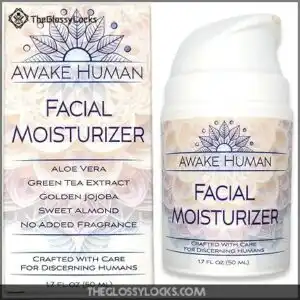
This all-natural face moisturizer tackles dry, sensitive skin with organic aloe vera, green tea, and shea butter.
Transform your sensitive skin with nature’s gentle touch and organic ingredients that actually work.
You’ll love how it absorbs quickly without leaving a greasy residue, making it perfect for morning and evening routines.
The fragrance-free formula won’t irritate your eyes or trigger breakouts, while the airless pump keeps ingredients fresh during travel.
Clinical evidence shows continuous use improves skin health within 28 days, and users report staying loyal through multiple bottles.
Choosing the right organic moisturizer options is vital for achieving ideal skin hydration and balance.
Best For: Those with dry, sensitive, or easily irritated skin seeking a clean, fragrance-free, vegan moisturizer that hydrates deeply without clogging pores.
- Fast-absorbing, lightweight texture leaves skin moisturized without a greasy feel
- Fragrance-free and safe for sensitive or acne-prone skin, including use around the eyes
- Eco-friendly, vegan, cruelty-free formula with organic ingredients
- No SPF or sun protection provided for daytime use
- May not offer enough nourishment for extremely dry or mature skin types
- Higher price point compared to conventional moisturizers due to organic and ethical sourcing
2. Grass Fed Whipped Honey Balm
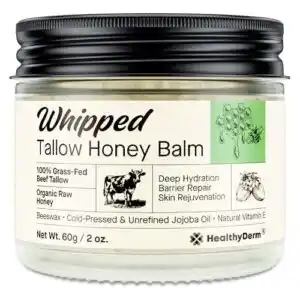
This whipped honey balm combines three powerhouse ingredients that’ll transform your sensitive skin routine.
Crafted from 100% grass-fed beef tallow, organic raw honey, and cold-pressed jojoba oil, it mimics your skin’s natural oils for superior moisture retention and barrier support.
The whipped texture absorbs easily without greasy residue, making it perfect for daily use on face, neck, and body.
Safe for all ages including infants, this fragrance-free formula soothes conditions like eczema and rosacea while delivering vitamins A, D, E, and K for enhanced skin renewal and resilience, providing superior moisture retention.
Best For: People with dry, sensitive, mature, or eczema-prone skin seeking a gentle, all-natural moisturizer that works for all ages.
- Deeply hydrates and repairs the skin barrier without greasiness
- 100% fragrance-free and safe for babies, pets, and allergy-prone users
- Versatile formula can be used on face, body, lips, and even as a diaper balm
- May melt or separate if stored in warm temperatures
- Some users might find the whipped tallow texture unusual at first
- Premium ingredient blend comes at a higher price point than basic moisturizers
3. Natural Microdermabrasion Facial Exfoliator Scrub
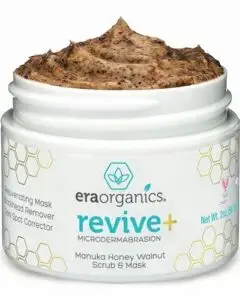
You’ll discover this gentle exfoliator packs serious power with its 9X superfood blend and medical-grade Manuka honey.
The walnut shell particles buff away dead skin while aloe vera and sunflower oil prevent irritation—perfect for sensitive types who’ve sworn off harsh scrubs.
Use it 1-2 times weekly as a scrub or leave it on as a mask for deeper treatment.
Users rave about clearer pores and brighter skin without the redness typical scrubs cause, achieving a more radiant and gentle skin care routine with the help of medical-grade ingredients.
Best For: People with sensitive, dull, or congested skin seeking gentle yet effective exfoliation using natural ingredients.
- Uses a 9X superfood blend with medical-grade Manuka honey for serious skin nourishment.
- Gently exfoliates with walnut shell while soothing with aloe vera and sunflower oil, minimizing irritation.
- Doubles as a mask for deeper treatment and visibly brighter, cleaner skin.
- Small jar size means it may run out quickly with regular use.
- Some users report a strange scent or concerns about product freshness.
- Results as a mask are subtle, with benefits less noticeable for some users.
4. Grass Fed Beef Tallow Moisturizer

This traditional remedy delivers serious hydration with vitamins A, D, E, and K that your skin craves.
Grass fed beef tallow’s fatty acid profile mirrors human sebum, making it incredibly compatible with sensitive skin types.
You’ll notice it forms a protective barrier that prevents moisture loss while deeply nourishing irritated areas.
The thick texture spreads easily and absorbs well, though patch testing is smart since it can clog pores for some users, which is why sensitive skin types should be cautious.
Best For: People with dry, sensitive, or irritated skin seeking deeply moisturizing, natural, and nutrient-rich care.
- Deeply hydrates and nourishes with a fatty acid profile similar to human skin.
- Safe for most sensitive and problem-prone skin, with soothing effects for eczema and dermatitis.
- Made from organic, grass fed sources with minimal, non-toxic ingredients.
- Can feel greasy, especially for daytime use or oily skin types.
- Unscented versions may have a mild natural beef odor.
- May clog pores or cause breakouts for some, especially if used excessively.
5. Natural Strawberry Lip Balm Moisturizer
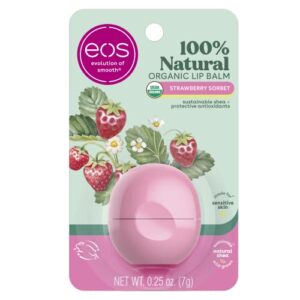
With lips as delicate as flower petals, you need protection that won’t irritate.
This USDA-certified organic balm combines shea butter, coconut oil, and jojoba oil to deeply moisturize while strawberry extract provides vitamin C antioxidants.
The paraben-free formula suits all skin types, including sensitive ones, and dermatologists recommend it for daily use.
You’ll love the unique orb container that won’t roll away, plus the natural strawberry flavor that mimics vine-ripened fruit without synthetic additives, giving it a natural taste.
Best For: Anyone seeking gentle, deeply moisturizing lip care with natural, organic ingredients, especially those with sensitive skin.
- Rich hydration and antioxidant protection from shea butter, coconut oil, and strawberry extract
- Paraben-free, cruelty-free, and dermatologist-recommended for sensitive lips
- Unique, easy-to-find orb container with a delicious natural strawberry flavor
- Some users with ultra-sensitive lips may experience irritation
- Higher price compared to traditional stick balms
- Mixed reviews about product expiration dates and shelf life
6. Natural Baby Eczema Healing Ointment
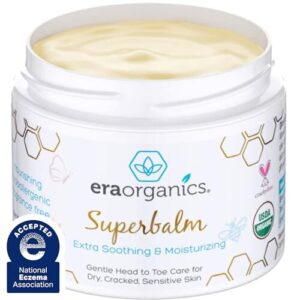
When your little one’s skin feels like sandpaper, you’ll want relief that’s gentler than a whisper.
This National Eczema Association-approved ointment combines colloidal oats, chamomile, and calendula to soothe irritated skin within hours.
Made with food-grade organic ingredients and zero harsh chemicals, it’s safe for newborns and adults alike.
The 2-ounce size travels easily, though some parents find they need frequent reapplication.
While pricier than drugstore alternatives, most users report significant improvement after first use, making it a worthwhile option for those seeking effective relief with gentler ingredients.
Best For: Parents looking for a gentle, natural solution to quickly soothe and heal baby eczema and sensitive skin without harsh chemicals.
- Approved by the National Eczema Association and made with food-grade, organic ingredients.
- Safe for all ages, including newborns and adults, with no perfumes, parabens, or fillers.
- Fast-acting relief—many see improvement after the first use.
- Needs frequent reapplication, especially for very dry skin.
- Small, 2-ounce container can feel expensive compared to drugstore brands.
- Some users report an unpleasant scent.
7. Avalon Organics Vitamin C Moisturizer
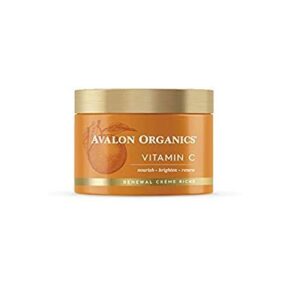
When you’re dealing with sensitive skin that craves vitamin C’s brightening power, Avalon Organics delivers without the drama.
This dermatologist-tested moisturizer combines their Triple-C Complex with soothing botanicals like turmeric and licorice root, creating a gentle yet effective formula that won’t trigger irritation.
You’ll appreciate how the lightweight gel-cream texture absorbs quickly while olive squalane and aloe vera provide lasting hydration.
Clinical testing shows 88% of users experienced softer, more hydrated skin after four weeks of use.
Best For: Anyone with sensitive, normal, or dry skin seeking gentle, brightening hydration from a certified-organic vitamin C moisturizer.
- Absorbs quickly with a lightweight, non-greasy gel-cream formula.
- Improves skin softness, hydration, and radiance with clinically tested results.
- Free from harsh chemicals, synthetic fragrances, and certified cruelty-free.
- Occasional packaging issues reported, including less-than-full jars and missing safety seals.
- Some users find the new formula heavier or less effective than previous versions.
- May be too rich for oily or acne-prone skin types.
8. Gentle Kids Foaming Face Wash
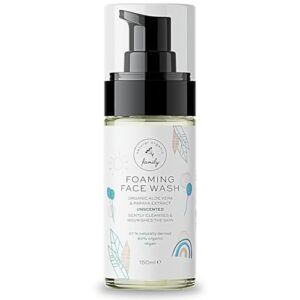
Over 80% of leading kids’ foaming face washes use certified organic ingredients, making them ideal for sensitive young skin.
You’ll find these gentle cleansers free from parabens, sulfates, and synthetic fragrances that typically trigger irritation.
Dermatologist-tested formulas with aloe vera and chamomile soothe while maintaining your child’s natural oil balance.
The tear-free, foaming action removes dirt without over-drying, and most parents report improved skin texture within weeks of consistent use.
Best For: Children with sensitive, delicate, or easily irritated skin who need a gentle and natural daily face wash.
- May cause irritation for some children due to salicylic acid or strong scent.
- Some users report a sticky residue that’s hard to rinse off.
- Occasional packaging issues, including leaks or spills during shipping.
- Made with organic and natural ingredients, free from harsh chemicals and synthetic fragrances.
- Mild, dermatologist-tested formula soothes skin and maintains its natural moisture balance.
- Tear-free and easy-to-use foaming pump, making skincare simple for kids.
9. Natural Verbena Soap Gift Set
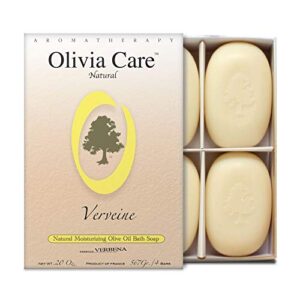
The Olivia Care Natural Verbena Soap Gift Set delivers gentle cleansing power that’s perfect for sensitive skin types.
You’ll appreciate the olive oil and verbena essential oils from Provence, which work together to moisturize while reducing inflammation from eczema and acne.
These cruelty-free, paraben-free bars create a luxurious lather without stripping your skin’s natural oils.
The set includes four long-lasting 5 oz. bars that leave your skin soft and clean without that tight, squeaky feeling many soaps create.
Best For: Anyone with sensitive, dry, or acne-prone skin who values natural, eco-friendly ingredients and soothing, non-irritating cleansing.
- Deeply moisturizes while calming eczema and acne with olive oil and verbena.
- Long-lasting triple-milled bars with pure, clean fragrance and gentle lather.
- Eco-friendly, cruelty-free, and free of parabens, phthalates, and plastic packaging.
- Some users may find a slightly oily residue after use.
- Scent and texture can vary between batches.
- Concerns about potential recent formula changes.
10. Natural Organic Lip Balm Trio
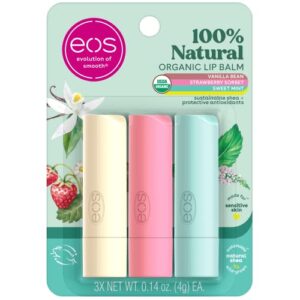
Nourishing your lips with organic ingredients becomes essential when you have sensitive skin that reacts to synthetic additives.
Natural organic lip balm trios offer gentle hydration through coconut oil, shea butter, and jojoba oil without harsh chemicals like parabens or phthalates.
These EWG-verified formulations provide long-lasting moisture for up to six hours while protecting your delicate lip skin.
You’ll appreciate the smooth, non-waxy texture that absorbs quickly without leaving sticky residue.
Best For: Individuals with sensitive skin who want natural, long-lasting lip hydration without harsh chemicals.
- Certified organic and hypoallergenic, safe for all skin types
- Non-sticky, smooth texture with up to six hours of moisture
- Eco-friendly packaging options support sustainable living
- Premium ingredients may come at a higher price
- Scent and flavor options may be limited to natural profiles
- Not all products offer sun protection or tinted varieties
Key Ingredients for Sensitive Skin Care
Understanding the right ingredients can transform your sensitive skin care routine from frustrating to effective.
You’ll want to focus on proven, gentle components that hydrate and protect while avoiding common irritants that trigger reactions.
Hyaluronic Acid for Hydration
Hyaluronic acid’s remarkable ability to bind 1,000 times its weight in water makes it your sensitive skin’s best friend.
This gentle powerhouse delivers deep hydration without irritation, strengthening your skin’s natural barrier. For ideal results, consider using products with sensitive skin benefits.
- Hyaluronic Benefits: Increases skin hydration by 31% and plumping by 30%
- Moisture Lock: Fortifies lipid barrier, reducing water loss and environmental damage
- Hydrating Tips: Apply acid serum to damp skin, layer with hypoallergenic moisturizer for maximum effectiveness
Vitamin C for Brightening and Protection
Vitamin C brightens your complexion while protecting against environmental damage through its powerful antioxidant properties.
This powerhouse ingredient stimulates collagen production, helping repair sun damage and fade dark spots naturally.
When you’re dealing with sensitive skin, vitamin C from organic skincare sources provides gentle yet effective skin brightening without harsh irritation, making it a great option for those who need to protect their skin while also repairing and rejuvenating it with powerful ingredients.
Calming Botanicals Like Chamomile
Calming botanicals like chamomile work as nature’s gentle therapists for your irritated skin.
These natural calmers contain anti-inflammatory compounds that reduce redness and soothe sensitivity without harsh side effects.
Chamomile benefits include healing properties that make it a cornerstone of botanical therapy.
You’ll find these herbal remedies in quality organic skincare products designed specifically for sensitive skin care needs.
Jojoba and Rosehip Oils for Repair
Beyond soothing botanical ingredients, jojoba and rosehip oils offer powerful skin repair benefits for sensitive skin.
These natural remedies work together to strengthen your skin barrier while providing gentle healing properties that won’t irritate reactive skin types.
Using rosehip oil can also provide additional skin brightening benefits to enhance facial restoration.
Key Oil Benefits for Facial Restoration:
- Jojoba oil mimics natural sebum – Creates a protective barrier that locks in moisture without clogging pores
- Rosehip oil delivers vitamin C and antioxidants – Boosts collagen production and fades hyperpigmentation naturally
- Combined oils enhance absorption – Oil blending increases nutrient delivery deeper into sensitive skin layers
- Both oils reduce inflammation – Clinical studies show decreased redness and irritation in organic skincare products
Gentle Exfoliants Such as Oatmeal
Professional skincare experts recommend gentle exfoliants for sensitive skin products because they remove dead cells without irritation.
Oatmeal benefits include natural saponins that cleanse while beta-glucans soothe inflammation.
Natural scrubs containing colloidal oatmeal provide skin smoothing effects through mechanical and chemical action.
Gentle peels using oat-based formulas offer effective exfoliation without harsh abrasives.
Follow exfoliant tips: use twice weekly maximum to prevent over-processing your delicate skin barrier.
Harmful Ingredients to Avoid
When you’re choosing skincare products for sensitive skin, you’ll want to steer clear of ingredients that can trigger irritation or allergic reactions.
These harmful chemicals can strip your skin’s natural protective barrier and cause redness, burning, or breakouts that’ll leave you reaching for the ice pack, which can lead to irritation.
Parabens and Hormone Disruptors
Parabens act as hormone disruptors, mimicking estrogen and interfering with your body’s natural hormone functions.
These toxic ingredients absorb nearly 100% through skin, causing endocrine damage that can affect reproductive health and organ function.
Chemical exposure from parabens has been linked to childhood obesity and altered hunger regulation.
Choose paraben-free, chemical-free cosmetics and natural skincare products to protect your sensitive skin from these harmful preservatives.
Synthetic Fragrances and Dyes
Synthetic fragrances and artificial dyes create a perfect storm for fragrance allergies and dye sensitivity in those with delicate skin.
These toxic additives lurk in countless products, triggering skin irritants that leave you red and uncomfortable.
Your best defense is to choose fragrance free lotion and natural skincare products labeled "fragrancefree" to sidestep these colorant risks entirely.
Harsh Sulfates Like SLS
When searching for sulfate-free options, you’ll protect your sensitive skin from harsh cleansing agents like SLS that strip away natural oils.
These aggressive detergents can trigger irritation and worsen existing skin conditions, making gentle alternatives essential for your skincare routine.
- Sulfate Effects: SLS creates excessive foam but damages your skin barrier, leading to dryness and inflammation
- Natural Cleansers: Plant-based surfactants provide effective cleansing without the harsh chemical impact of traditional sulfates
- Gentle Alternatives: Look for products labeled "SLS Free" to guarantee your natural skincare routine supports sensitive skin health
Formaldehyde-releasing Preservatives
Finding formaldehyde-releasing preservatives in skincare products can feel like discovering unwelcome guests at your skin’s party.
These toxic chemicals, including DMDM hydantoin and quaternium-15, slowly release formaldehyde over time, causing significant skin irritation and chemical reactions.
You’ll want preservative-free alternatives to avoid these serious health impacts and protect your sensitive skin from unnecessary exposure.
Understanding the risks of harmful ingredients like toxic skin care is essential for making informed decisions about your skincare routine.
Phthalates in Fragrances
Many scented products contain phthalates, chemical compounds that help fragrances last longer on your skin.
These toxic fragrances pose phthalate risks including hormone disruption and reproductive issues.
Since fragrance regulation remains limited, manufacturers aren’t required to disclose phthalate content.
Chemical exposure from scented products can trigger reactions in sensitive skin.
Choose phthalate-free and fragrance-free natural skincare with nontoxic ingredients instead.
Choosing The Right Organic Skincare Brand
When choosing organic skincare for sensitive skin, you’ll want to look for third-party certifications like EWG Verified or Leaping Bunny, which guarantee products meet strict safety and cruelty-free standards.
These certifications take the guesswork out of shopping, so you can focus on finding formulas that actually work for your skin type rather than deciphering complicated ingredient lists, which is made easier with certifications like these, ensuring products meet strict safety standards.
Certifications Like EWG and Leaping Bunny
When you’re shopping for organic skincare products, third-party certifications act like trusted friends who’ve already done the homework for you.
Look for these reliable stamps of approval:
- EWG Verification – Over 1,300 products meet their strict safety standards
- Leaping Bunny certification – Guarantees no animal testing throughout production
- Eco certifications – Verify sustainable and ethical sourcing practices
- Cruelty-free labels – Confirm no harm to animals during development
- Organic certifications – Confirm natural ingredients without synthetic additives
These sustainable labels help you navigate marketing claims and identify genuinely safe, cruelty-free natural skincare that won’t irritate sensitive skin.
Sustainability in Packaging and Sourcing
Smart choices in eco-friendly packaging and sustainable sourcing can transform your skincare routine into an environmental victory.
Today’s conscious consumers demand transparency about how their products impact the planet.
| Packaging Innovation | Sourcing Standards | Environmental Impact |
|---|---|---|
| Biodegradable tubes made from sugarcane | Wildcrafted botanicals from certified farms | 70% less carbon footprint |
| Recyclable glass containers with refill options | Fair-trade organic ingredients | Zero plastic waste streams |
| Compostable labels using soy-based inks | Regenerative agriculture partnerships | Water conservation practices |
Look for brands using green materials like bamboo caps, recycled aluminum, and plant-based plastics.
Sustainable ingredients sourced through ethical partnerships protect both your skin and ecosystems.
Companies with robust recycling practices often provide take-back programs for empty containers.
Cruelty-free and Vegan Options
Beyond sustainable packaging, ethical testing practices matter just as much for your sensitive skin care routine.
Cruelty-free and vegan skincare options protect both your skin and animal rights while delivering effective results.
When choosing ethical brands, look for:
- Leaping Bunny certification – The gold standard for cruelty-free verification, ensuring no animal testing at any production stage
- Vegan formulations – Plant-based ingredients without animal-derived components like beeswax or lanolin that can irritate sensitive skin
- Transparent labeling – Clear disclosure of nontoxic ingredients and ethical sourcing practices on eco packaging
These crueltyfree brands often use gentler botanical extracts perfect for sensitive skin.
Vegan skincare typically contains fewer potential allergens since it excludes common irritants like dairy proteins.
Your sustainable beauty choices support companies that align with your values while prioritizing your skin’s health.
Dermatologist-recommended Brands
When choosing dermatologist-recommended brands for sensitive skin, skin experts consistently highlight True Botanicals and Ursa Major for their clinically proven results.
These natural skincare brands feature nontoxic ingredients that repair skin barriers without irritation.
For the best results, following a sensitive skin care routine that’s customized to individual skin types is vital.
| Brand | Key Feature | Dermatologist Notes |
|---|---|---|
| True Botanicals | MADE SAFE certified | Proven barrier repair results |
| Ursa Major | Plant-based formulas | Daily use for sensitive types |
| Annmarie Skin Care | pH-balanced products | Reduces redness effectively |
| Pai Skincare | Organic certifications | Specifically targets sensitivity |
Brand reviews show these organic skincare options deliver therapeutic benefits while maintaining gentle formulations that dermatologist tips consistently recommend.
Budget-friendly Yet Effective Choices
Your wallet doesn’t need to suffer for healthy skin. Affordable skincare brands like Cocokind and W3ll People prove that natural remedies and organic alternatives can be budget-friendly without sacrificing quality.
These eco friendly options offer gentle skincare products that won’t break the bank while protecting sensitive skin with organic skincare formulations.
Many people achieve healthy skin through proper natural skincare routines, which is a key factor in maintaining natural skincare habits.
Frequently Asked Questions (FAQs)
What are natural and organic skincare products?
Natural and organic skincare products use plant-based ingredients like botanical extracts, essential oils, and minerals instead of synthetic chemicals.
They’re gentler, reduce irritation risks, and support your skin’s natural barrier function effectively.
What are the best natural skincare products for sensitive skin?
Studies show 90% of people with sensitive skin experience fewer reactions when using fragrance-free products.
You’ll find gentle relief with Tower 28’s SOS spray, Bio-First’s rescue lotion, or Indie Lee’s soothing cleanser—all pack healing ingredients without harsh chemicals.
Can organic skincare help sensitive skin?
Yes, organic skincare can substantially help sensitive skin.
You’ll find gentler ingredients like chamomile and oatmeal that soothe irritation without harsh chemicals.
These products reduce allergic reactions and strengthen your skin’s natural barrier function effectively.
Why should you choose organic & nontoxic skincare products?
Like a shield protecting your skin’s delicate ecosystem, organic skincare eliminates harmful chemicals that can trigger reactions.
You’ll avoid parabens, sulfates, and synthetic fragrances while nourishing your skin with gentle, vitamin-rich botanicals that support your natural barrier.
What are the best organic skincare products?
Looking for top organic skincare picks?
Choose brands like True Botanicals, Herbivore Botanicals, and Cocokind for proven results.
These companies combine gentle, plant-based ingredients with effective formulas that won’t irritate your skin while delivering real benefits.
What skincare is best for sensitive skin?
While many think natural always means gentle, that’s not true.
You’ll want fragrance-free products with gentle ingredients like colloidal oatmeal, ceramides, and hyaluronic acid that won’t irritate your skin’s protective barrier.
What natural products are suitable for sensitive skin?
You’ll find gentle relief with colloidal oatmeal, chamomile, and hyaluronic acid. These soothing ingredients calm irritation while hydrating without harsh chemicals that typically trigger reactions.
Which organic brand is best for skin care?
True Botanicals stands out as the top organic skincare brand, offering MADE SAFE certified products with wildcrafted ingredients.
You’ll find their formulas effective yet gentle, backed by rigorous testing and sustainable practices, which makes them a leader in the industry with sustainable methods.
What skin care ingredients to avoid if you have sensitive skin?
Up to 45% of people experience skin reactions from common skincare ingredients.
If you’ve got sensitive skin, avoid parabens, sulfates, synthetic fragrances, formaldehyde releasers, and artificial dyes—they’re like uninvited guests at your skin’s party, causing irritation and allergic reactions that leave you uncomfortable.
What is the best natural skin care for sensitive skin?
Looking for gentle skincare? Choose fragrance-free products with colloidal oatmeal, hyaluronic acid, and ceramides.
Brands like Tower 28, Blissoma, and Indie Lee offer effective solutions that won’t irritate your delicate skin barrier, providing gentle skincare options.
Conclusion
Ready to transform your sensitive skin routine?
Making the switch to natural and organic sensitive skin care products isn’t just a trend—it’s a scientifically-backed approach to healthier skin.
These carefully formulated products eliminate common irritants while delivering gentle, effective results.
You’ll notice reduced redness, fewer breakouts, and improved skin barrier function within weeks.
Remember to patch-test new products and introduce them gradually.
Your skin deserves the purest ingredients nature offers.
- https://www.persistencemarketresearch.com/market-research/natural-and-organic-personal-care-market.asp
- https://www.grandviewresearch.com/industry-analysis/organic-skin-care-market
- https://www.kbvresearch.com/sensitive-skin-care-products-market/
- https://www.zigpoll.com/content/can-the-researcher-provide-the-latest-insights-on-consumer-preferences-for-natural-ingredients-in-skincare-products-and-how-these-trends-are-shaping-purchasing-decisions
- https://sweetbeenaturals.com/blogs/news/why-organic-skin-care-products-are-better














